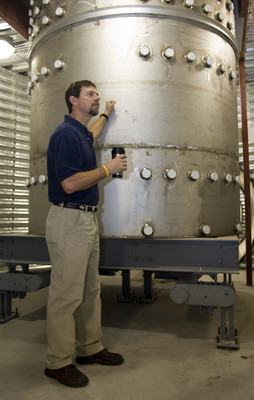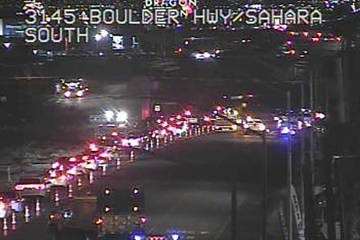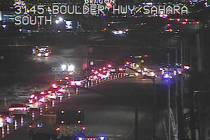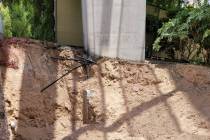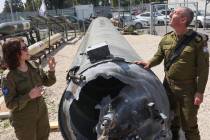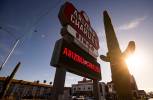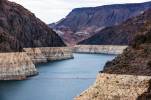New lab will refine desert soil research
An underground lab in Boulder City soon will become a hotbed of soil research in Southern Nevada and give the first in-depth look into desert soil, local researchers hope.
The Desert Research Institute, thanks to millions of dollars in funding from the National Science Foundation, has installed 10-foot-tall stainless steel drums into the desert behind its Boulder City building.
Once equipped with a host of electronics and filled with dirt, the drums, known as lysimeters, will allow researchers to do everything from watching plant roots grow to monitoring underground gases.
"We want to know, for example, what happens to plants when the soil has been disturbed? Where does the water go when it rains?" DRI associate research professor Michael Young said.
In fast-growing Southern Nevada, where construction has ravaged local landscapes and water resources continue to disappear, the new lab will provide important insights on how to better manage water and rebuild ecosystems, Young said.
The research could produce information for homeowners and local agencies on how to better conserve water through landscaping, Young said.
The National Science Foundation has allocated about $3 million for the project in the hopes of making it a major regional hub of desert research.
Over the next three years, the agency will fully fund or partially fund more than 40 faculty, graduate students and researchers from Nevada and the West to work at the lab.
University of Nevada, Las Vegas associate professor Zhongbo Yu estimated that the lysimeters are the second-largest in the country.
"We're really excited about it," said Yu, who will oversee several doctoral and post-graduate students working at the lab. "We can go do a lot of research now."
The money also will breathe new life into DRI's abandoned facility in Boulder City, which was intended for solar research when it was built in the 1970s.
But as the 1980s saw national funding for solar research dry up, DRI left the building largely empty, with the National Park Service renting the space on occasion, Young said.
DRI's four lysimeters are like massive coffee cans buried in the desert with the tops flush with the surface.
They're currently empty, but researchers plan to fill the lysimeters with dirt from a nearby area, while matching the soil composition inside the lysimeter and the plant life above it.
For example, if a level of caliche, the rock-hard clay that resides just a few feet below the surface of most of Southern Nevada, was six feet below the surface at the site of the excavated dirt, it also would be six feet below the top of the lysimeter.
The process of duplicating soil levels can be arduous. One lysimeter at the University of Arizona in Tucson took three weeks to fill, said Young, who was a student at the university at the time.
In a more ambitious effort that has intimidated contractors so far, Young said, DRI has hopes to fill a rectangular lysimeter without disturbing the dirt.
Underground, researchers have access to a host of sophisticated electronic monitoring devices inside the lysimeters.
The devices can monitor rainfall to within 0.02 millimeters, far better than any rain gauge, Young said. A long, clear tube also will run through the lysimeter, and a video camera will be able to observe the growth of plant roots.
Other devices will be able to monitor gas levels and density, and the lysimeter itself will rest on a scale able to support 100,000 pounds. The data will be posted online for anybody to use for research.
After the $3 million NSF funding runs out, Young said scientists can use the facility for additional funding. As long as there are questions that the facility might be able to answer, it will remain open.
"We need to know the answers to these questions," Young said. "Things are changing too quickly for us to get our arms around it."
Contact reporter Lawrence Mower at lmower @reviewjournal.com or (702) 383-0440.



